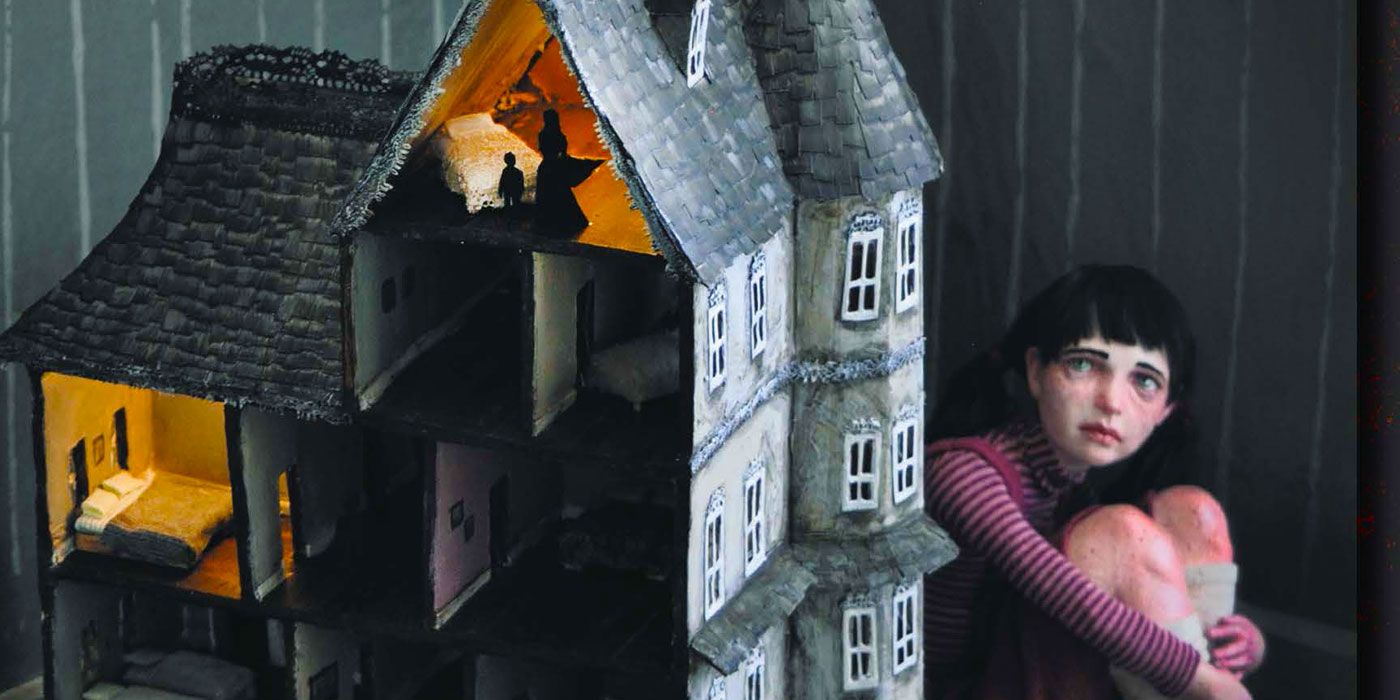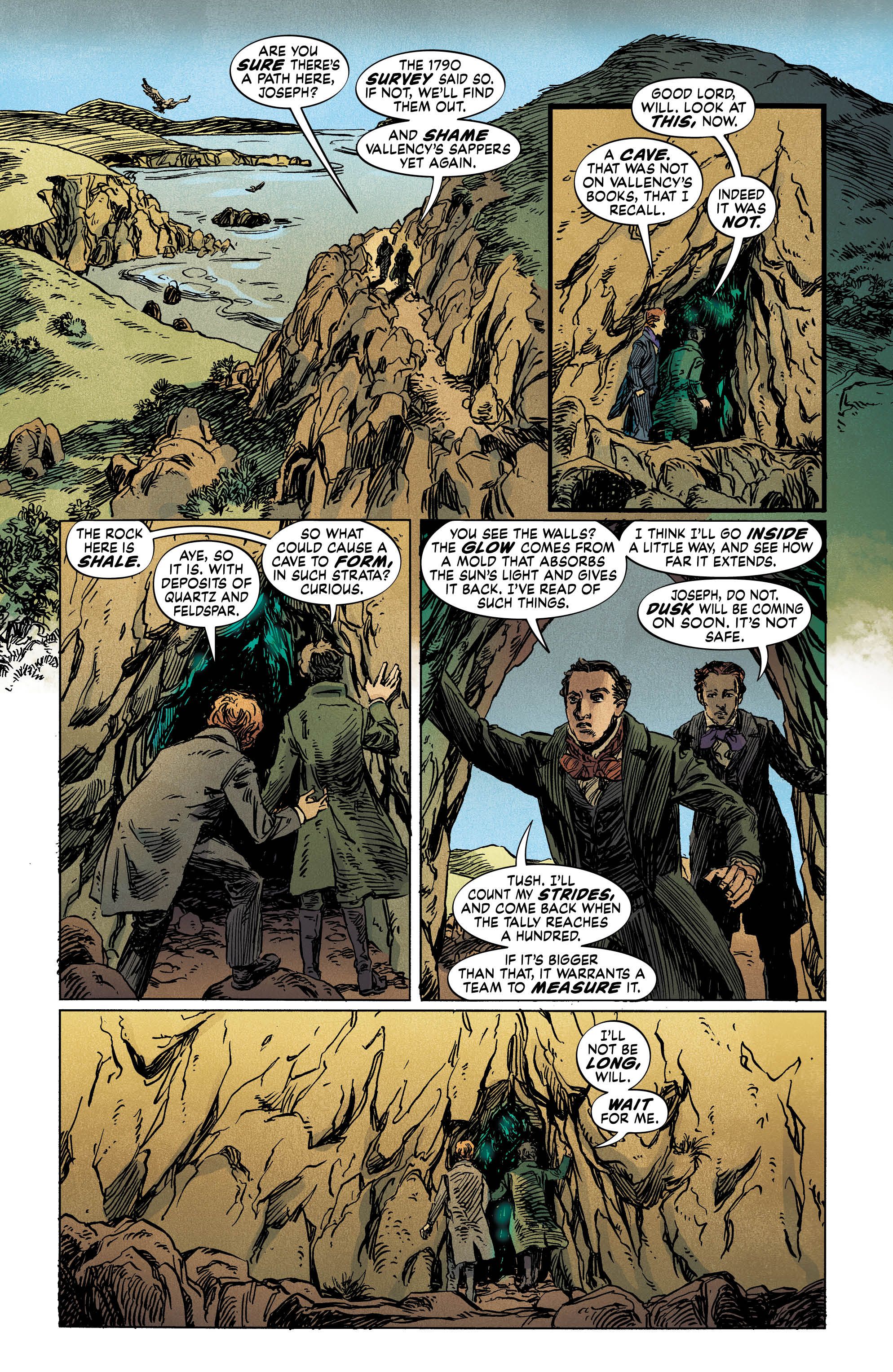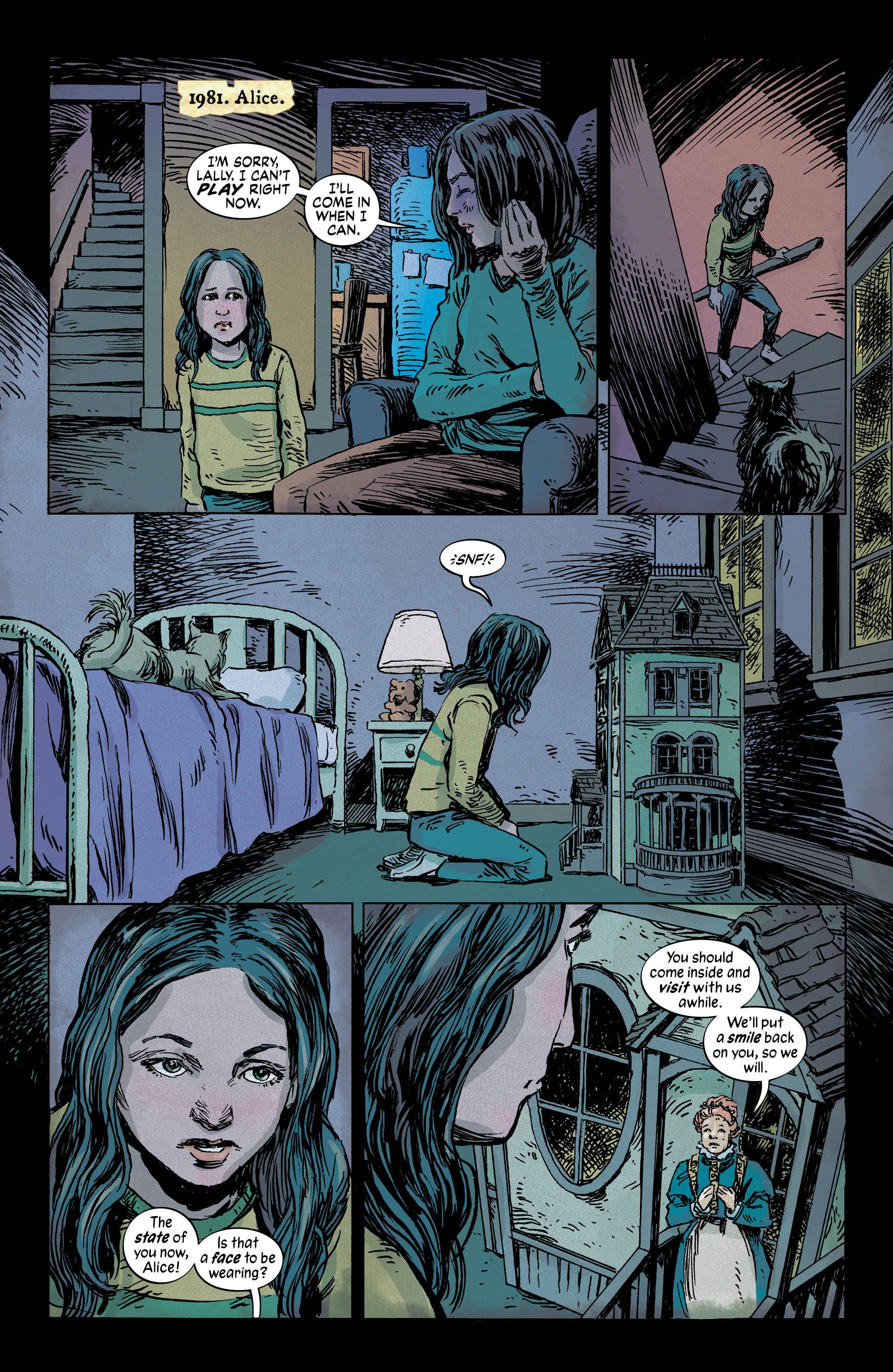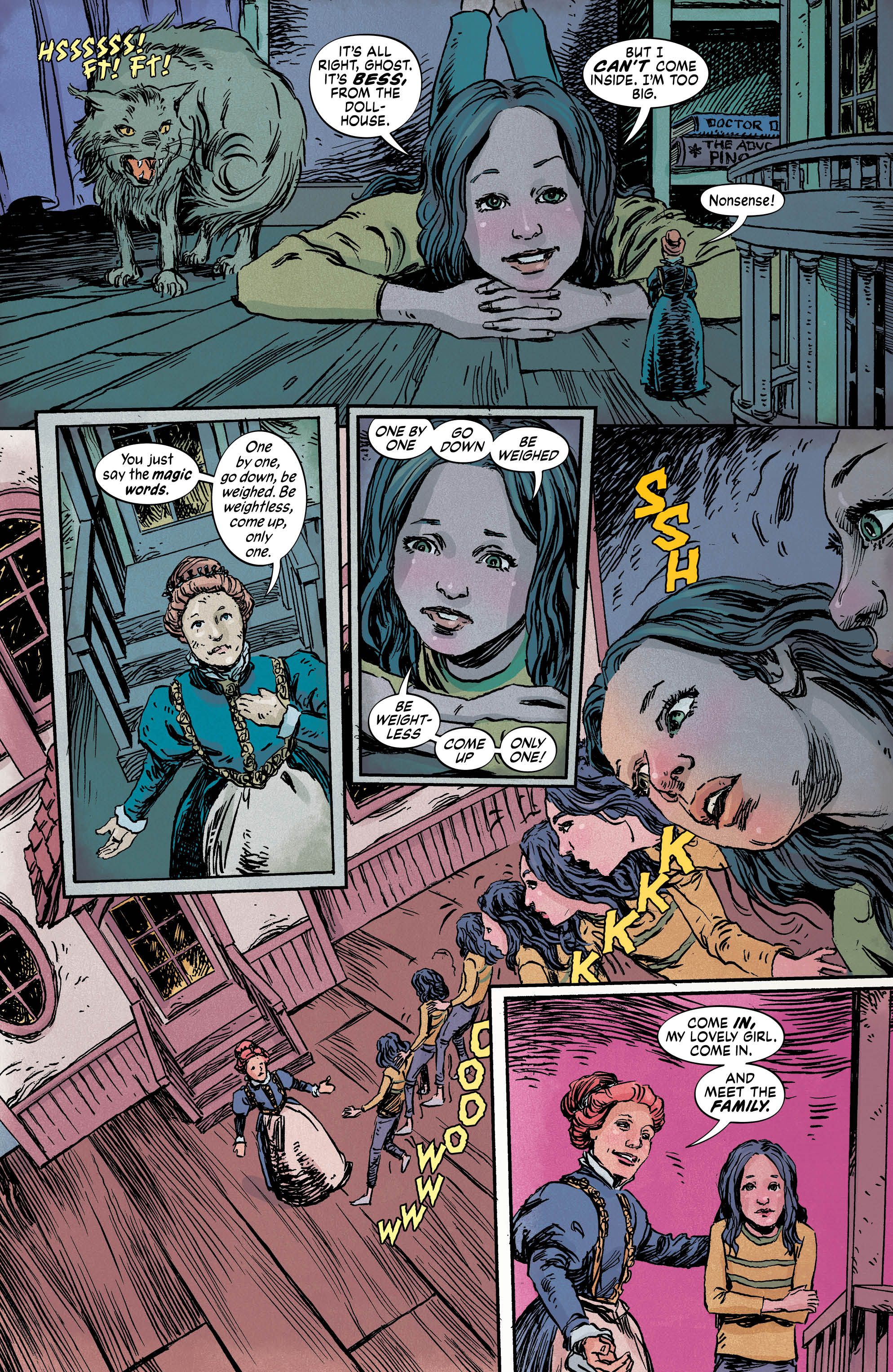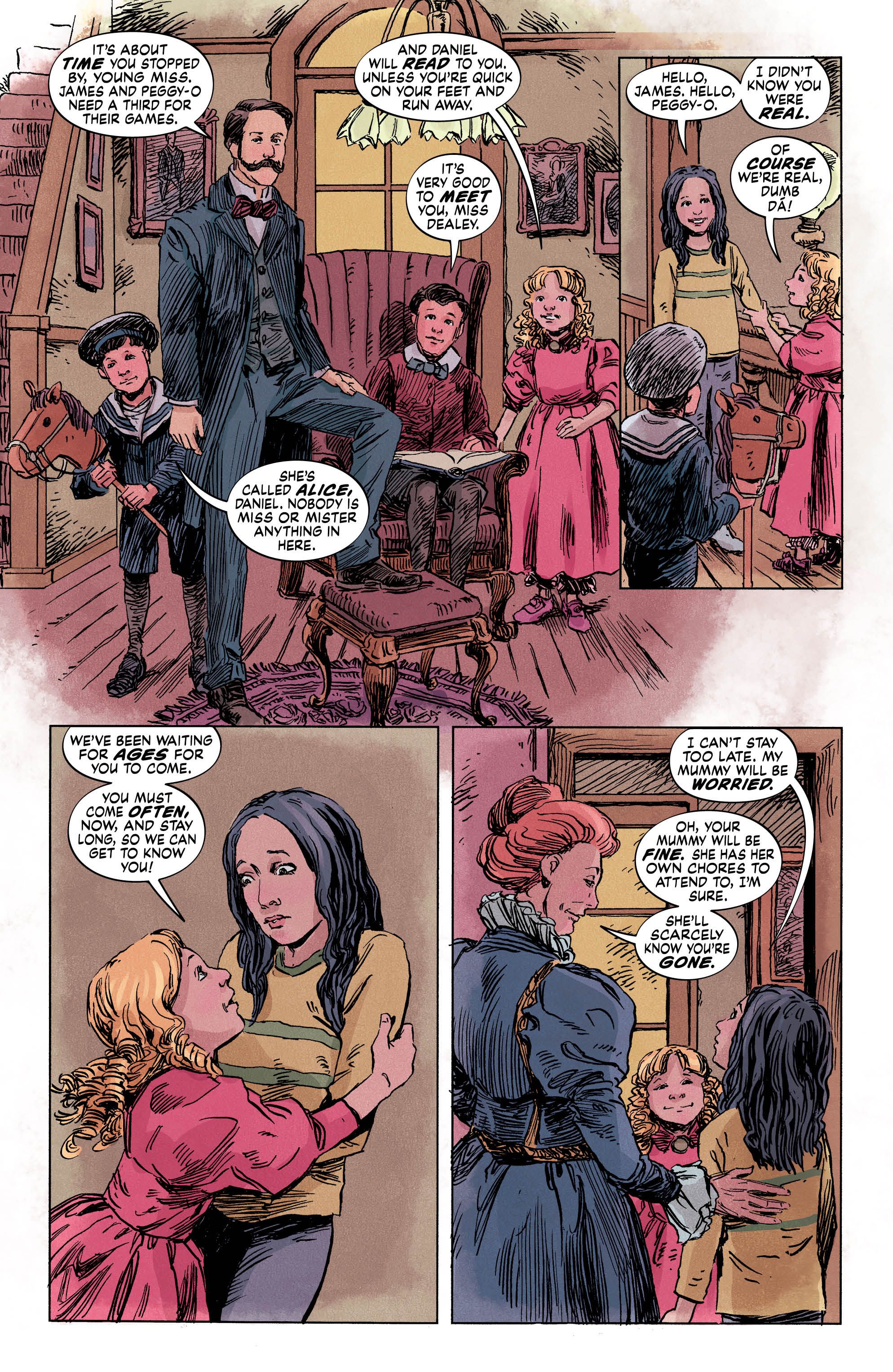Although they've worked on other projects together, writer Mike Carey and artist Peter Gross are probably best known for long-running Vertigo series The Unwritten, which followed the inspiration for a series of children's stories. The two have now reunited for The Dollhouse Family #1, which is the second offering from DC's Joe Hill-curated Hill House Comics imprint.
Dollhouse Family #1 follows Alice, who receives a 19th-century dollhouse as a child. Over time, Alice learns she can enter the house and interact with the people inside, including a father figure who treats her with more warmth and kindness than her own. Alice's story, however, isn't the only one told in Dollhouse Family, with another plot following a surveyor named Joseph finding a mysterious cave more than a century earlier.
CBR spoke with Carey and Gross by phone creating Dollhouse Family #1, horror as a genre and more.
CBR: What are you guys most excited for people to see in The Dollhouse Family?
Carey: I think it's a story that is kind of like big and sprawling. It has lots and lots of different threads that come together in the course of the series. And I'm excited for people to guess at those connections and get them wrong, be pleasurably surprised as the explanations gradually emerge. I think we've done a very good job of creating a story that will [fool] readers in some ways.
Gross: And I'd say from my point of view, it's a little more pedantic. I'm excited to see me and Mike back together working on something.
You guys have worked together on a lot of different comics. How was that different this time around?
Gross: Well, it's a little different because I've had some hand trouble the last couple years. And so I'm too slow to do a monthly all on my own. So we're working with Vince Locke, [who] is the finisher from the start on this. So it's a little bit different that way... We really wanted Vince's look on it, so I think Mike's probably writing with that in mind a little bit.
Carey: Yup.
Peter: And I am definitely doing the layouts with that in mind. But also it gives me a chance -- I'm really just just concentrating on the storytelling and bringing out the darker themes in Mike's writing.
Carey: But in other respects it does feel like bringing together the old gang, doesn't it? Because so many of us worked on The Unwritten together. Peter and I've done close to 200 comics together by this point, and we have a kind of working dynamic that's really liberating. Peter was just talking about storytelling, and I think one of the glories of working with him is that -- sorry, this is going to make you blush, man -- I think he's one of the best visual storytellers in the business. And his art is always in the service of the story, and I think the best work I've done in comics has been with him on pencils.
Gross: That's so sweet!
That's probably the sweetest thing I've heard in an interview.
Gross: Well, I've got to say something about Mike then, don't I?
Yeah, say something nice about Mike in return!
Gross: I absolutely love working with Mike. In my head I think, "Okay, I'm gonna go off on my own and just do my own thing and write my own thing for a while." And then Mike sends me a story that's like, damn it. Just when I think I'm out, I'm back in. His writing is great. And the lines... such great, quotable, in-depth, thoughtful lines that he comes up with, and they're just a thrill to illustrate just because the language is beautiful.
Carey: Shucks.
Gross: That was so eloquent, Mike... The other fun thing [about] the two of us working together is we don't have big comic book egos. Probably the opposite in some ways. Like, we probably don't hype ourselves that much. Obviously, we hype each other to each other. But beyond that, we just kind of quietly do the work and put the product out.
Carey: I think it's been interesting this time around that we have the two different timelines and they've both involved a fair amount of research for you, haven't they? You've been looking at costumes in the Victorian, in the 19th century and architecture and so on.
Gross: Yeah, I worry about getting it right way too much. I gotta ease up on it and just use a little artistic license. Like, I'll spend hours looking for the horse drawn funeral carriage that's just right for this one little panel where you can't even see the thing because it's so far away.
Switching topics a little bit, in many ways, Alice is living two different horror stories in this book. There's that kind of more generically conventional one that she's dealing with in the form of the dollhouse itself, but she also is going through this kind of very true-to-life horror story of living with a horribly abusive parent. Can you speak to that choice to have these two stories going simultaneously?
Carey: It's a strand that runs through most of the work that Peter and I have done together. Although it wasn't horror, most of it would be dark fantasy, but we've always felt that if you get the real world stuff right, if you get the real world references right, the character beats, the relationships and the reference to what you might call realistic themes and issues, then the fantasy works harder, it works better, for being rooted in those things... It's kind of like you're buying that suspension of disbelief.
Certainly in horror, the most horrific things are not the sort of big, abstract things. And they're not monsters. They're the minutiae of every trauma, of every day ordeals. Obviously domestic abuse is a huge, a huge example of that. Going forward, we're going to follow Alice through a large portion of her life, and we're going to see some of those issues play through. I think we're going to keep that anchor in real, lived experience in different ways all the way through the series. I think it's important to have that focus, to have those real world echoes running through the story.
Gross: Yeah, I absolutely agree with that. I mean, in some ways, it's the core of our everyday life that just is gripping. For me, definitely. The way the supernatural horror elements almost go hand in hand with that girl from that illustrate. It's like a, I don't know, like a tumor growing. So that supernatural part reflects what's going on in her real life. I was thinking the other day that this is a little similar to Jordan Peele's Get Out or something like that, where you have that real sense of this ordinary life trying to happen and then underneath it is just this pulsing thing.
On that subject, Something else that made me really curious about this book is that, as a genre, horror is not something that has ever really gone away. But it feels like it's coming back right now in a really big way. Why do you think horror is so appealing to audiences right now?
Carey: I think there's definitely a sense -- as with post-apocalyptic sci-fi, which is also having a huge Renaissance right now -- in which when the real world becomes precarious and unpredictable and kind of frightening -- which it is at the moment, there's so much uncertainty in international affairs, both on your side of the Atlantic and mine -- I think people turn to horror narratives and to apocalyptic narratives partly as a way of coping and exploring the things that are making them frightened in the real world, but at one remove.
I think also, in a weird way, there's a consolation to be found in being frightened by things that actually are not directly going to attack you, being frightened by fictions that you can then, when the story's over, you can close the book or turn off the TV and be back in your own space.
Gross: You're falling back into Unwritten there.
Carey: Yeah, but it's true, isn't it? I think a lot of the time we use stories almost as extensions of our lived experiences. It's like we drift in and out of narratives all the time. The choices that we make about those narratives, I think, reflect a psychological state at any given moment. Sorry, that sounds really pretentious.
Gross: I think you're right. I mean, I was thinking the same. I chuckled at the question because I was watching the impeachment hearings right before this. It's definitely that. There's a certain horrifying element we can't control to our society right now, you know. It's subtle. I think that's why this kind of horror is coming, where it's the horror that grows out of everyday things, because it is all around us right now. Definitely. Genre fictions are kind of like cultural snapshots of the moment we're in. And I think that's why we're getting the resurgence of horror. It's definitely saying something about our culture right now.
Peter, this is more for you specifically. How did you and Vince want to illustrate horror and those darker themes in this book?
Gross: I went into this thinking, I haven't done horror before really. There have been horrifying elements and stuff, but I was drawn towards Vince finishing it from the start. Like I said to someone else before, Vince draws horror even when he's not trying to. It's in that kind of Bernie Wrightson line work quality that is just so textured and it's evocative. They call his lines very evocative. And I think that that's what I wanted to get out of this, because it's such a psychological story and the high horror elements are very visual. Each issue they grow more and more visual, and I wanted to bring justice to that. Actually I was a little concerned that, on my own, it might not have that feel as much as it could. And Vince [is] just absolutely knocking it out of the park that way.
What's it been like working with the Hill House pop-up imprint as a whole?
Carey: It's been crazy fun. At the moment when Joe first mentioned it to me at a signing in London, I was just really excited by the concept. It feels like he's very much putting his stamp on the line. He's given us a sort of marked way map and an aesthetic to incorporate, so it's been inspiring. It has taken me, personally, outside my usual haunts, my usual comfort zone, in good ways... It's very easy as a creator to sort of keep on doing the thing that you did last. This feels like something that we haven't done before, and so we're putting together a new tool box for it, which is great.
Gross: I've been really struck with that sense of energy and it being an exciting time. It's very similar to the way Vertigo was when I was starting out with it. I was lucky enough to be around there when that happened. There's a freshness to it, and they're kind of like, "Let's take chances, let's just throw things against the wall and see what's going to work here."
It's exciting. It's fun. Over the years, that feeling got less and less as corporate demands and sales... I mean, Vertigo got old, basically. And this is the young and fresh, and it's super fun to be there at the beginning of it.
Carey: Joe is a great collaborator. He comes up with amazing ideas. He'll take a look at a script and say, "Oh, you could do that!" In issue #2, he said, "You gotta have a cutaway of the dollhouse.,," We thought about it and we came up with -- I say we, most of the work was done by Peter and Vince -- gorgeous glimpse of the interior and how it all fits together. That was Joe's idea.
Gross: And I have to say, I was totally against it.
Carey: Yeah, I think it took you like eight times as long.
Gross: But it's like the best moment, though.
Is there anything else that you'd like to add or you'd like people to know about The Dollhouse Family?
Carey: Just that it's not going where you think it's going. There are some fakeouts along the way. I think that when the various trades come together, they come together in a way that, hopefully, will surprise people.
Gross: I would say that it's great the way it just escalates every issue, and it grows every issue, so it's an exciting ride.
Dollhouse Family #2 releases Dec. 11.

